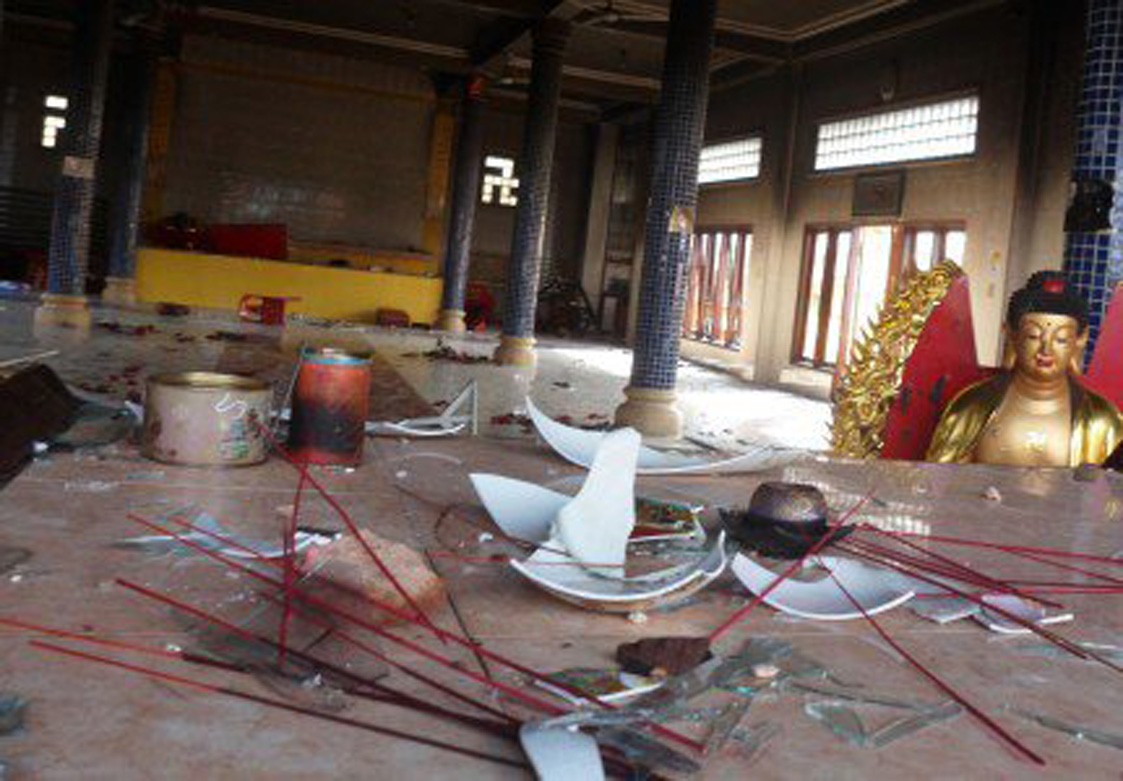Popular Reads
Top Results
Can't find what you're looking for?
View all search resultsPopular Reads
Top Results
Can't find what you're looking for?
View all search resultsEthnic Chinese flee riot city
Change text size
Gift Premium Articles
to Anyone
 The condition of Tri Ratna vihara in Tanjung Balai, North Sumatra on July 29. The vihara was damaged after angry mobs attacked the vihara and several other Buddhist houses of worship. (Antara/Anton)
The condition of Tri Ratna vihara in Tanjung Balai, North Sumatra on July 29. The vihara was damaged after angry mobs attacked the vihara and several other Buddhist houses of worship. (Antara/Anton)
H
aunted by the trauma of anti-Chinese rioting in 1998, a number of residents of Tanjungbalai, North Sumatra, have fled their homes following the recent ransacking and burning of viharas and pagodas in the port city.
A member of the Indonesian-Chinese community, Tony, alias Aci, said that those who had left were so traumatized by the incident, fearful that the 1998 anti-Chinese riots would be repeated, that they had decided to go abroad.
He said many of them had left for Malaysia and Singapore as both countries were close to Tanjungbalai.
“Many of them have still not returned from Malaysia and Singapore. They say they are still traumatized,” Tony, who runs his own business, told The Jakarta Post on Wednesday.
He said he was in Singapore when the riot broke out in city at the end of July and saw many people of Chinese descent from the city arriving in Singapore. He himself was afraid to return home for three days after the riot.
“Who was not frightened at that time? All the temples were burned and destroyed, just like in the riots in 1998,” said Tony, who said he had always previously felt comfortable living in Tanjungbalai.
The trouble reportedly started when local woman Meliana, a woman of Chinese descent, complained about the volume of the loudspeaker that a local mosque used to broadcast the adzan (call to prayer).
Provocative messages then circulated on social media saying the woman had thrown rocks at the mosque and forcefully stopped prayers and these are believed to have fueled the anger of locals.
Tri Ratna Vihara Foundation chairman Petjong Li, also known as Akhun, said he was very surprised that the riot had been triggered by Meliana’s complaint.
“We deeply regret Meliana’s complaint, which triggered the incident in Tanjungbalai,” Akhun said after he accompanied a lawmaker observing the damage to the Tri Ratna temple.
He said that because of Meliana, a woman who was not well-known among the Chinese community in Tanjungbalai, the interfaith harmony in the city had been ruptured and temples burned down. He expressed the hope that the people involved would face punishment for their actions.
Fourteen temples in Tanjungbalai were burned and ransacked by mobs on Friday night and early Saturday morning. No fatalities were reported in the incident but damage ran into the billions of rupiah.
The local police have so far arrested 21 suspects in the case. They comprise eight looters, nine people accused of burning or ransacking temples and four provocateurs, of whom two are underage.
A community leader in Tanjungbalai, Zulkifli Marpaung, said a number of major businessmen had left the city when the riot broke out. Zulkifli said he did not know where they had gone.
“They left on the night of the riot,” said Zulkifli.
Zulkifli said that not all of the city had been affected by the riot but the businessmen still left because of fears of a bigger riot erupting as happened in 1998.
Tanjungbalai Mayor M. Syahrial said he had not heard reports of an exodus of residents of Chinese people, but some might have left the city over safety fears.
He gave an assurance that the city was currently peaceful with no reports of any trouble.
“It’s safe now. Nobody should leave the city,” he said.
Syahrial called on all residents who had left the city to return and get back to their day-to-day routines.
In 1998, the Chinese-Indonesian community was targeted by mobs and many members of the community were killed and raped. The mobs blamed Chinese-Indonesians for the economic crisis that led to the downfall of then president Soeharto. In 2006, students in Makassar, South Sulawesi, rallied and called for the expulsion of Chinese-Indonesians after a local court convicted a man of Chinese descent of abusing his two maids and killing one of them.
___________________________
To receive comprehensive and earlier access to The Jakarta Post print edition, please subscribe to our epaper through iOS' iTunes, Android's Google Play, Blackberry World or Microsoft's Windows Store. Subscription includes free daily editions of The Nation, The Star Malaysia, the Philippine Daily Inquirer and Asia News.
For print subscription, please contact our call center at (+6221) 5360014 or subscription@thejakartapost.com









